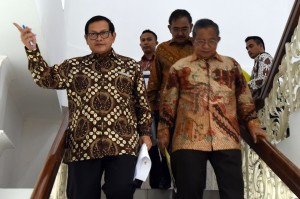Govt Launches 13thEconomic Policy Package on Low-Income Housing

Photo caption: Coordinating Minister for the Economy accompanied by Cabinet Secretary PramonoAnung before announcing the 13theconomic policy package at the Presidential Office, Jakarta, Wednesday (24/8). (Rahmad/Public Relations Division)
In a bid to implement the One Million House Program as the manifestation of the second point of the Governments Nawacita (nine priority programs of Jokowi-JK Administration), the Government on Wednesday (24/8) announced the 13thEconomic Policy Package on Low-Income Housing.
This economic policy package will improve access for the people to buy houses, said Coordinating Minister for the EconomyDarmin Nasution during the announcement of the package at the Presidential Palace, Jakarta, Wednesday (24/8).
Based on the data from the Central Statistics Agency (BPS) until the end of 2015, Darmin said 17.3% or around 11.8 million households in Indonesia live in housing they do not own (rent houses, someone elses house, official houses,or they do not have houses at all).
In the meantime, Darmin said that the developer of luxury housing are still not willing to provide low and medium housing because to build an inexpensive housing complex covering 5 hectares for example, they need long permits and big funds.
Therefore, through this package, the Government will issuea government regulation that contains the simplification of the number of permits and the time required by eliminating or reducing a numberof permits and recommendations needed to build low-income housing from 33 permits and stages into 11 permits and stages.
By reducing permits and stages, time needed to build low-income housing now reaches 44 days on average, from the previous 769-981 days, Darmin said.
In details, the package includes:
- Permits that are eliminated are among others: location permitsin 60 working days, approval of the picture of the master plan in 7 working days, recommendation of floods levelin 30-60 working days, approval and the endorsement of the site plan picture in 5-7 working days and the Environmental Impact Analysis of the Traffic (AndalLalin) in 30 working days;
- Permits that are combined include: (1) the proposal of the developer (by attaching land certificate, the payment proof of the land and building taxes (the last year) along with the Statement Letter of the Absence of Dispute (attached with the detailed map of lands/block/village) if the land is not certified yet; (2) the Permit of Land Use (IPT)/the Permit of Space Use (IPR), combined withthe stages of the checking of suitability of RUTR/RDTR of Region (KRK) and Technical Considerations of the Arrangement of Land/Advise Planning, Endorsement of Site Plan processed simultaneously with the environment permit that includes the Statement of Letter of Environment Management/SPPL (until 5 hectares); as well as (3) theendorsement of the site plan that is processed at the same time with the permit of the environment that includes SPPL (extent less than 5 hectares), recommendation of fires, and the retribution of the provision of land for burial sites or provide burial sites;
- Permits that are accelerated are among others: (1) the Letter of Waiver of the Land (SPH) from the owner of the land to the developer (from 15 working days into 3 working days); (2) the measuring and the making of land map (from 90 working days into 14 working days); (3) The issuance of main a Buiding Construction Permit (IMB)and the breaking down of the IMB (from 30 working days into 3 working days); (4) Evaluation and issuance of Decision Letter (SK)on the stipulation of the land rights (from 213 working days into 3 working days); (5) the breaking down of certificate on behalf of the developer (from 120 working days into 5 working days); and (6) breaking down of the land and building tax on behalf of the consumer (from 30 working days into 3 working days).
Darmin further said that the Government hopes with the new policy package, the development of low-income housing can be fast realized because the deduction, the combination, and the acceleration of the permits to build low-income housing will reduce the costs to obtain permits by up to 70 percent. (RMI/DND/RHD/ES)(EP/YM/Naster)








